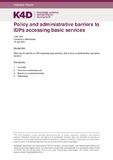| dc.contributor.author | Kelly, Luke | |
| dc.date.accessioned | 2021-09-07T11:56:19Z | |
| dc.date.available | 2021-09-07T11:56:19Z | |
| dc.date.issued | 2021-07-16 | |
| dc.identifier.citation | Kelly, L. (2021). Policy and administrative barriers to IDPs accessing basic services. K4D Helpdesk Report. Institute of Development Studies, DOI: 10.19088/K4D.2021.112 | en |
| dc.identifier.uri | https://opendocs.ids.ac.uk/opendocs/handle/20.500.12413/16830 | |
| dc.description.abstract | Literature shows that IDPs struggle to access services, which has an impact on their ability to live healthy and fulfilling lives. In the field of health, IDPs frequently have worse outcomes than both host community and refugees. This rapid literature review finds evidence of a number of policy and administrative barriers to access of services for internally displaced persons (IDPs). IDPs remain citizens of the countries in which they are displaced, and the national authorities retain responsibility for meeting their basic rights. However, their displacement, loss of livelihoods and assets, lack of documentation, as well as discrimination against them, lack of protection under international law, lack of policy to address their needs, poor services and conflict or disaster conditions, can all make it more difficult for IDPs to access basic services than non-displaced citizens. There is relatively little literature systematically addressing the issue of administrative and policy barriers to service access among IDPs. Much of the literature discusses IDPs alongside refugees (who have a different legal status and access to different national and international support), or discusses the whole range of difficulties facing IDPs but does not focus on administrative or policy barriers. The literature frequently does not compare IDPs and other citizens and service users. Nevertheless, policy and administrative barriers are discussed, ranging from analysis of international instruments on IDPs to documentation procedures in particular countries. Much of the literature shows the prevalence of disease, lack of school attendance, limited provision of services etc. faced by IDPs, but does not discuss the policy and administrative barriers in detail. | en |
| dc.description.sponsorship | Foreign, Commonwealth & Development Office (FCDO) | en |
| dc.language.iso | en | en |
| dc.publisher | Institute of Development Studies | en |
| dc.relation.ispartofseries | K4D Helpdesk Report;1030 | |
| dc.rights.uri | https://www.nationalarchives.gov.uk/doc/open-government-licence/version/3/ | en |
| dc.subject | Rights | en |
| dc.subject | Security and Conflict | en |
| dc.subject | Social Protection | en |
| dc.title | Policy and Administrative Barriers to IDPs Accessing Basic Services | en |
| dc.type | Helpdesk | en |
| dc.rights.holder | © Crown copyright 2021 | en |
| dc.identifier.doi | 10.19088/K4D.2021.112 | |
| dcterms.dateAccepted | 2021-07-16 | |
| rioxxterms.funder | Default funder | en |
| rioxxterms.identifier.project | K4D | en |
| rioxxterms.version | VoR | en |
| rioxxterms.versionofrecord | 10.19088/K4D.2021.112 | en |
| rioxxterms.funder.project | 0986883a-6d0f-4bb8-9c46-5e0682934d65 | en |

